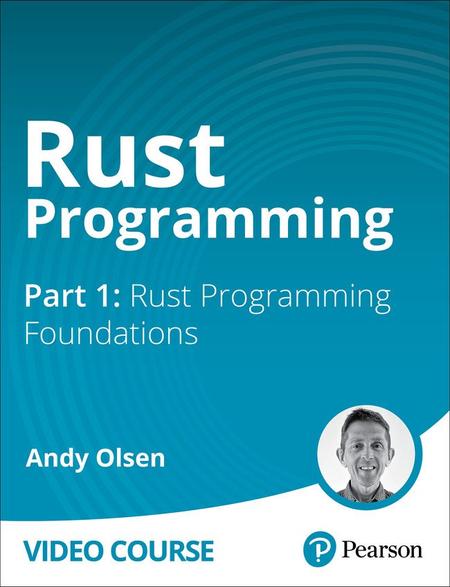English | MP4 | AVC 1280×720 | AAC 44KHz 2ch | 51 Lessons (7h 4m) | 1.49 GB
Rust Programming Part 1 teaches you the foundations of Rust programming through clear training and detailed examples. Rust is the language many passionate programmers have embraced because of its expressiveness, sophistication, and rigor. The Rust language combines the efficiency, speed, and low-level power of C/C++ with the benefits of higher-level languages such as Java, Python, and C# and you can use it to implement all kinds of solutions including embedded systems, DevOps operators, operating systems, and platforms, and much more besides.
Rust Programming Foundations is Part 1 of your learning journey. You will learn about the Rust toolset, the Rust type system, and how to implement flow control. You will also learn how to use compound types and collections, and how Rust carefully manages the lifetime of objects and how they are referenced safely in your code. Experienced trainer Andy Olsen will systematically show you how to avoid the pitfalls and errors that are common in C and C++.
Topics included in this course
- Getting Started with Rust starts with a quick overview of Rust as a programming language and shows you how to download the Rust toolset.
- Understanding Rust Variables and Types shows how to declare variables in Rust and takes a closer look at some of the primitive types available in the language.
- Implementing Flow Control shows how to implement conditional logic and iteration in Rust.
- Understanding Enums describes the syntax for defining and using enum types, also discusses some of the important standard enums in the Rust library.
- Using Compound Types and Collections shows how to create and use arrays and tuples, and how to use vectors and maps in the Rust collection library.
- Understanding Ownership in Rust dives into the details of how Rust manages the lifetime of objects. You will learn about the differences between copying values and moving values in Rust.
- Understanding Borrowing in Rust looks at a concept called “borrowing”, which is effectively where you take a reference to a variable without claiming ownership.
Learn How To
- Create, build, and run Rust applications
- Organize Rust code and application structure properly
- Manage memory safely and effectively
- Course requirement
Table of Contents
Introduction
Rust Programming Part 1 Introduction
Lesson 1 Getting Started with Rust
Learning objectives
Overview of Rust
Writing your first Rust application
Building and running your first Rust application
Creating an application by using Cargo
Building and running an application by using Cargo
Lesson 2 Understanding Rust Variables and Types
Learning objectives
Integer types
Floating-point types
Other simple types
Additional techniques
Lesson 3 Implementing Flow Control
Learning objectives
If-tests
Matching
Loops
Using break and continue
Lesson 4 Understanding Enums
Learning objectives
Defining and using simple enums – Part 1
Defining and using simple enums – Part 2
Avoiding warnings about unused variants
Defining and using enums with data
Using the Option enum
Using the Result enum
Lesson 5 Using Compound Types and Collections
Learning objectives
Creating and using arrays
Array techniques
Creating and using tuples
Creating and using vectors
Creating and using maps
Lesson 6 Understanding Ownership in Rust
Learning objectives
Understanding local scope
Defining static local scope – Part 1
Defining static local scope – Part 2
Defining static global scope
Defining static mutable variables – Part 1
Defining static mutable variables – Part 2
Understanding strings in Rust – Part 1
Understanding strings in Rust – Part 2
Copying vs. moving
Cloning
Lesson 7 Understanding Borrowing in Rust
Learning objectives
Understanding simple borrowing
Understanding the Rust borrow checker
Introduction to string slices
String slice techniques
Introduction to array slices
Array slice techniques
Module 1 Rust Programming Essentials
Module introduction
Module 2 Rust Ownership and Borrowing
Module introduction
Summary
Rust Programming Part 1 Summary
Resolve the captcha to access the links!
